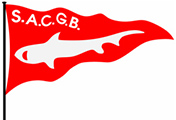The Shark Angling Club of Great Britain (SACGB) wish to register their concern regarding the potential inclusion of the Porbeagle in schedule 5 of the Wildlife and Countryside ACT (WCA). We feel that the inclusion of the Porbeagle on a list which contains species such as the Burbot (which is considered extinct in UK watercourses), is an overreaction, which does not reflect the current state of the stock for the species and maybe used to promote a ban on the recreational catch and release Porbeagle fishery in the UK.
The SACGB are totally committed to shark conservation and have been active in promoting good handling practices and conservation of shark species.
Over the past years the SACGB have been working closely with scientists, many whom were totally unaware of the populations and geographical extent of shark species in UK waters.
Many have come to realise the only way to study these creatures is to go aboard a sharking boat, rather than rely on data from an unmotivated commercial fleet who provide only dead sharks.
The SACGB has an unparalleled database of shark captures dating back to the 1950s with an effort component, thus is in a unique position monitor for the numbers and locations of the shark captures throughout UK waters in near real-time.
As indicated by the recent paper submitted to ICCAT from SACGB and many other shark skippers’ data, there has been an increase of Porbeagle numbers and of geographical spread since the zero Total Allowable Catch (TAC) for commercial targeting in 2010.. The data shows increases in both recruitment of year 0 fish and of sub-adult and adult fish in UK waters, with fish returning to areas that they have been absent from since the 1970s.
Of particular concern is the affect of any ban on the north coast of Devon and Cornwall recreational fishery for the Porbeagle .
The charter boats that work this coast are well aware of the importance of this area and how the welfare of the shark are paramount both the recovery of stocks and to their livelyhoods and as such have committed to stringent handline guidelines that they have developed. No sharks are boarded, the use of circle hooks are mandatory to reduce gut hooking and fight times are reduced by the use of suitable tackle.
Recent data from Exeter University and the Sulikowski Shark and Fish Conservation Lab in the USA indicated excellent outcomes for recreationally captured Porbeagle and the time series data from this area suggests that populations are increasing.
The impact of the inclusion of the Porbeagle in schedule 5 of the WCA may not provide any additional protection for the fish and threatens the ability of scientists and angler to cooperate to provide data on a species that ICCAT acknowledge are hugely understudied. In addition recent experience of banning of large pelagic fish in the UK have proved unsuccessful and have in fact led to the inexperienced angler targeting fish rather than use experienced skippers with a proven track record of high welfare standards, who can no longer operate.
The SACGB will continue their commitment to shark conservation and acknowledge that any potential recovery in Porbeagle stocks is tentative, due to the long generation times and low fecundity of the species. However, we consider the inclusion of the Porbeagle in schedule 5 of the WCA to be an overreaction and detrimental to both the scientific understanding and recovery of this iconic apex predator.
Yours sincerely,
Bob Woodman
Chairman SACGB
